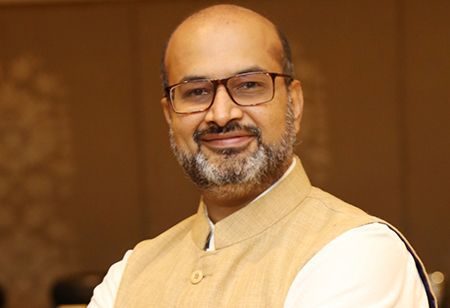
Why is Financial Risk Management Important?


Mandeep Mehta, Group Chief Financial Officer, PB Fintech, 0
BYJU’s, the Indian ed-tech startup, was a hot sell on Wall Street. The most valuable startup in India’s history has many takers. In 2021, this interest peaked, and investment offers flooded to the tune of $1.2 billion, giving BYJU’s a new chest for global expansion. However, in a complex case of enterprise risk management (ERM) failure, the company’s world turned upside down. From financial risks of over 20:1 debt-to-equity ratio to sticking on to its complex business model and reputational damage in shut-eye time, BYJU’s could never foresee what was coming, reminding organizations of the importance of risk assessment and management. Mandeep Mehta, Group Chief Financial Officer, PB Fintech, joins us for an exclusive interaction wherein he talks about risk assessment and management, as well as other aspects of financial management. Below is an excerpt from the interview.
How can CFOs effectively recognize and evaluate potential threats that might affect the company's financial objectives?
A robust Enterprise Risk Management framework is extremely important for identifying and mitigating risks. It enables organizations to monitor action plans effectively and ensure alignment with financial goals. Next, staying ahead of technological and regulatory advancements is another critical component. The pace of change in these areas requires quick and smooth adaptation to build financial resilience. Collaboration with industry bodies and policymakers ensures better alignment with macroeconomic trends and evolving regulations. Tools like sandboxes, war rooms and scenario planning are invaluable as they allow us to simulate potential disruptions, assess their impact and refine strategies in real-time. These methods collectively enhance an organization's ability to remain agile and forward-thinking in the face of uncertainty.
This involves a lot of decision-making. How do you align decisions with the strategic objectives of the company?
Not all decisions hold the same weight, and CFOs must prioritize those that drive the
organization's long-term value. Clear capital allocation strategies, aligned with short, medium, and long-term goals, are the key. The first step is defining what success looks like across these time horizons and acknowledging that business environments are dynamic. This requires an agile roadmap that adapts to shifting market conditions without losing sight of core milestones. A CFO’s role is to be both a strategist and a realist, ensuring every decision contributes to the broader vision.
What is the role of technologies like AI in all this, especially in financial planning and analysis?
While AI can handle non-standardized data, it’s more important to prioritize data quality. This is critical in optimizing resources and ensuring you are determining accurate insights. A well-thought-out database roadmap should guide automation initiatives, while ensuring scalability and relevance. Training the team on technical skills is essential, but it must go hand-in-hand with real-world projects that let them apply their knowledge. Clear communication is a must -sharing progress and celebrating small wins keeps the team motivated and aligned. Lastly, leaders should remain agile in approach, adapting processes as needed, but they need to stay committed to project delivery.
What kind of learning environment can complement this approach?
Leaders must cultivate an environment where team members are not only aware of the diverse needs of stakeholders but also equipped to address them with ease. This involves building a culture of transparency where mistakes are seen as learning opportunities. Language and interpersonal skills are foundational, but beyond that, it’s important to have the courage to communicate honestly to bridge gaps and foster stronger connections. A team should also be open to taking calculated risks, as this mindset drives innovation and adaptability in communication strategies.
What advice would you give to the upcoming financial leaders in the industry?
Curiosity is your greatest asset - stay hungry for knowledge and adapt to changing landscapes. Think like an enabler, focusing on how financial strategies can empower business growth. Always approach challenges with a risk-assessment lens, helping businesses navigate uncertainties effectively. Most importantly, nurture your team, invest in their growth and create an environment where collaboration thrives. A strong, cohesive team is the foundation of any successful financial strategy.
Think like an enabler, focusing on how financial strategies can empower business growth.
What is the role of technologies like AI in all this, especially in financial planning and analysis?
While AI can handle non-standardized data, it’s more important to prioritize data quality. This is critical in optimizing resources and ensuring you are determining accurate insights. A well-thought-out database roadmap should guide automation initiatives, while ensuring scalability and relevance. Training the team on technical skills is essential, but it must go hand-in-hand with real-world projects that let them apply their knowledge. Clear communication is a must -sharing progress and celebrating small wins keeps the team motivated and aligned. Lastly, leaders should remain agile in approach, adapting processes as needed, but they need to stay committed to project delivery.
What kind of learning environment can complement this approach?
Leaders must cultivate an environment where team members are not only aware of the diverse needs of stakeholders but also equipped to address them with ease. This involves building a culture of transparency where mistakes are seen as learning opportunities. Language and interpersonal skills are foundational, but beyond that, it’s important to have the courage to communicate honestly to bridge gaps and foster stronger connections. A team should also be open to taking calculated risks, as this mindset drives innovation and adaptability in communication strategies.
What advice would you give to the upcoming financial leaders in the industry?
Curiosity is your greatest asset - stay hungry for knowledge and adapt to changing landscapes. Think like an enabler, focusing on how financial strategies can empower business growth. Always approach challenges with a risk-assessment lens, helping businesses navigate uncertainties effectively. Most importantly, nurture your team, invest in their growth and create an environment where collaboration thrives. A strong, cohesive team is the foundation of any successful financial strategy.